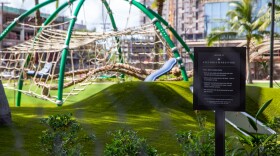State Board of Agriculture and Biosecurity members have unanimously passed a measure to protect Molokaʻi from the coconut rhinoceros beetle.
Molokaʻi remains the only island where the highly invasive beetle has not been found.
The rule will restrict the transport of materials to Molokaʻi that are known to harbor CRB. Restricted materials include soil, compost, wood chips, mulch and other landscaping materials.
Molokaʻi residents and cultural practitioners Kunani and Ipo Nihipali spearheaded a petition calling for immediate action.
After board members heard the petition last month, it received unanimous support from a state advisory committee last week. The measure also got overwhelming community backing.

Jonathan Ho, the Plant Quarantine Branch manager for the Department of Agriculture and Biosecurity, called the rule “unprecedented.”
“We understand the unique situation of Molokaʻi,” said Ho at Tuesday’s Board of Agriculture and Biosecurity meeting.
“So based on the finding of an emergency and unanimous recommendation of the Nihipalis’ proposed into rule by the Advisory Committee on Plants and Animals, the strong support by the general public, elected officials, and the Molokaʻi community at both the prior board’s meeting in July and the committee meeting that was occurred last week Wednesday, and testimony from the Molokaʻi community that there would really be no negative harm, we're recommending approval of Appendix E.”
The approved version of the measure mirrors the originally proposed petition, with the addition of a severability clause. Ho said the clause ensures that if one portion of the interim rule is found in court to be unconstitutional or unenforceable, the rest of the measure can remain in place.
The measure recognizes Molokaʻi’s role in protecting coconut as a food and cultural resource, and represents the first rule of its kind against the spread of CRB.
“It’s going to take us doing our part, and the community doing their part, to make sure CRB doesn’t get established on Molokaʻi,” Ho said.
He said he will immediately work with Young Brothers, local businesses shipping materials impacted by the measure, and Hawaiʻi port staff, to inform, educate and train them on the new rule.
Kali Arce, Hoʻolehua homesteader and director of the Maui County Department of Agriculture, said her department is working collaboratively with agencies and community groups in monitoring and preventative efforts.
The county is also working with farmers on soil remediation and other resources to help reduce the need for imported compost. In her support of the interim rule, Arce testified that CRB on the island could cause “irreversible damage to our food source on Molokaʻi and the pristine, untouched native plant ecosystems.”
“CRB would greatly impact Molokaʻi’s food security,” she said. “Niu is cultivated by our Hawaiian homesteader farmers on Molokaʻi for food security and diversifying our agriculture. Niu is culturally important, evident by the 160-year-old-plus Kapuāiwa Grove [planted by King Kamehameha V]. Other CRB host plants that could be impacted include banana, sugar cane, ʻulu and pineapple, which are grown for subsistence.”
The interim rule went into effect Wednesday, Sept. 24, and will remain in place for one year.





